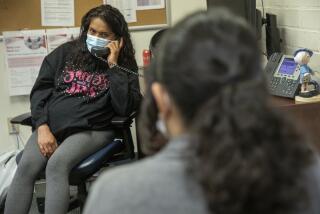Health Plan Scams Taking Advantage of Poor Families
- Share via
By the time 4-year-old Juan Carlos visited a dentist, his teeth were decayed and he cried from the pain of his gum infection. He needed immediate care and two teeth were eventually extracted.
His mother thought that she had enrolled him in a government-assisted health insurance program that would cover the costs. But like other poor and recent immigrants, she discovered too late that she had been victimized.
Months earlier, she had called a toll-free number that she read on a flier. A man came to the door of her South-Central Los Angeles home, claiming that he would enroll Juan Carlos in California’s Healthy Families insurance program. She paid him $27 in cash premiums, but weeks, then months, went by with no word.
“I’m angry about the man lying to me and that my son had to go through . . . the pain,” said the woman, who asked that her name not be used.
Like other families that have been targeted, the woman was asked for cash--a sure indication that the helper is not what he appears to be. Applicants should never be asked for or pay cash to apply for such programs, state officials said. It also is unfortunate, they said, that con artists were claiming to represent Healthy Families--a federal-state health insurance program for the poor--to prey on low-income families that desperately need medical care. “We are very, very concerned about any individual that would try to inhibit people from enrolling in Medi-Cal or Healthy Families,” said Ken August, a spokesman for the state Department of Health Services. “Anyone who would prey on low-income individuals and ask them to pay money upfront is unscrupulous.”
Ana Valenzuela, a caseworker from Maternal and Child Health Access, a Los Angeles agency that assists families, said it took just one afternoon to determine that Juan Carlos was eligible for Medi-Cal and not Healthy Families. But his mother had already spent $75 on his dental bills.
“She wasted months to find out if her child was eligible for Healthy Families,” Valenzuela said. “It is frustrating, especially when there is a child with a lot of pain.”
Advocates for the poor are concerned that other residents are responding to solicitations, both through fliers and by people coming to the door.
In other recent cases, people have been approached by door-to-door “assisters” who say they will help enroll families in Healthy Families, officials said.
“I’ve heard enough reports of assisters not doing what they’re supposed to be doing, it leads me to believe that whoever is policing them is not doing a good job,” said Barbara Frankel, supervising attorney for the Health Consumer Center of Los Angeles, a free advocacy service that assists low-income Los Angeles County residents.
Glendale Woman Recounts Fraud
One Glendale mother with two young children said a woman came to her door in May and took a one-month cash premium of $9 for Healthy Families, but her kids were never enrolled.
Speaking through a translator, the Glendale woman said she and her sister, who also paid a premium, thought the assister was legitimate.
As a result, the woman delayed her 11-month-old daughter’s vaccinations and her son also went without health coverage.
Melva Atayde, a counselor at the Health Consumer Center, said her agency quickly determined that the family’s income was too low for Healthy Families but that they were eligible for Medi-Cal.
“They’re not supposed to take an application, just assist [families] with filling it out--and not take cash,” Atayde said of assisters.
Frankel said that such cases are difficult to track because consumers may not understand how the Healthy Families program works--including the requirement that a family must send in their application themselves.
When families do have trouble with forms or need to verify that they are enrolled, Frankel said, they are hampered by long waits to get through to state Healthy Families’ phone lines.
“If [they] call the hotline, they are on hold for 20 to 30 minutes,” she said. “Our clients are working with people who can’t always wait that long.”
August, the state health spokesman, said his department is aware of the phone delays and will convert to an automated system as early as September to improve service.
August said two toll-free numbers are available: (888) 747-1222 to get an application and (800) 880-5305 for assistance.
To deal with the delays, August said, officials have increased the number of phone operators from 55 to 75.
More to Read
Sign up for Essential California
The most important California stories and recommendations in your inbox every morning.
You may occasionally receive promotional content from the Los Angeles Times.










